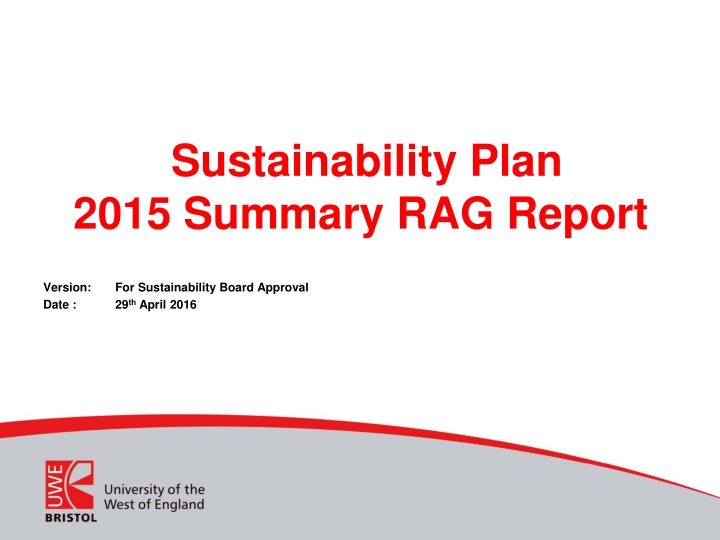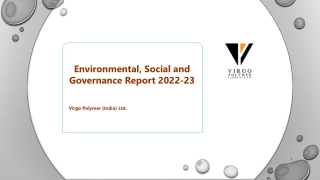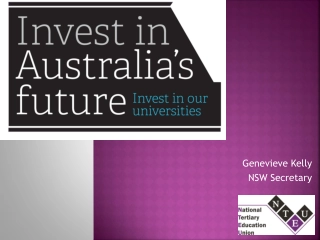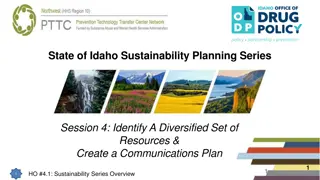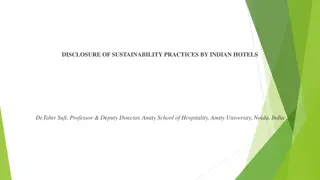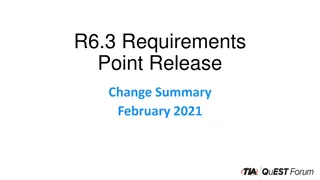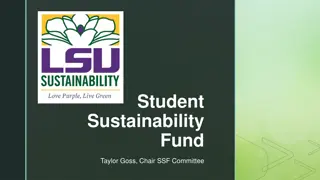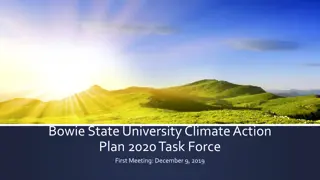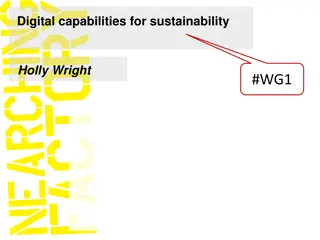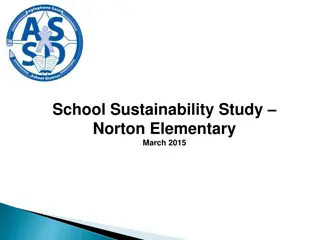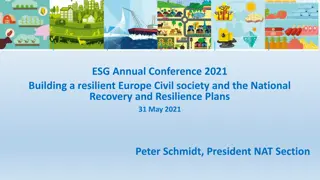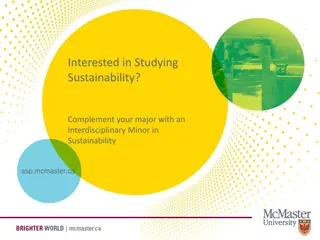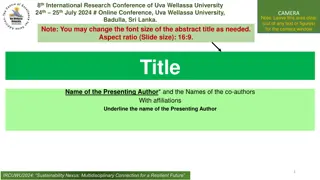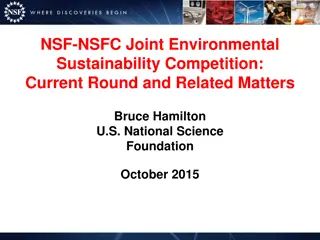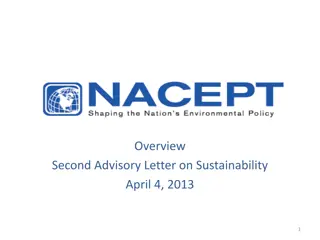University Sustainability Plan 2015 Summary
University Sustainability Plan 2015 Summary RAG Report highlights the progress made towards sustainability goals from 2013-2020. It covers governance, thematic areas, RAG assessment against targets, and actions taken in various sustainability aspects such as health, wellbeing, community, education, procurement, energy management, campus development, waste management, water conservation, IT, and travel.
Download Presentation

Please find below an Image/Link to download the presentation.
The content on the website is provided AS IS for your information and personal use only. It may not be sold, licensed, or shared on other websites without obtaining consent from the author.If you encounter any issues during the download, it is possible that the publisher has removed the file from their server.
You are allowed to download the files provided on this website for personal or commercial use, subject to the condition that they are used lawfully. All files are the property of their respective owners.
The content on the website is provided AS IS for your information and personal use only. It may not be sold, licensed, or shared on other websites without obtaining consent from the author.
E N D
Presentation Transcript
Sustainability Plan 2015 Summary RAG Report Version: Date : For Sustainability Board Approval 29thApril 2016
Introduction In late 2013 and early 2014 the University and the Students Union approved the university s Sustainability Plan 2013 2020. The Plan takes its authority from Strategy 2020 and is designed to meet the ambitious sustainability aims embedded within that strategy. The Plan: Outlines the University s sustainability aims for the period 2013 2020. Defines the mechanisms by which sustainability is embedded within the University s day to day operation and effective decision making. Contributes to UWE Bristol s 2020 Strategy ambition by advancing the health and sustainability of our locality and region. Contributes to UWE Bristol s 2020 Strategy priorities through the delivery of ready and able, sustainability literate, graduates. Guides the development of sustainable estate infrastructure. Governance This plan spans the years 2013 - 2020. Overall responsibility of its objectives sits with the Vice-Chancellor, Chair of the Board of Governors and the President of the Students Union. It is monitored through the UWE Bristol Sustainability Board, which reports to the VCAB, Board of Governors and Academic Board. Leadership of the Sustainability Plan is delegated to the Deputy Vice- Chancellor and Assistant Vice Chancellor and through them to the teams that will deliver the aims of the plan. The Plan is divided into 11 thematic areas with an implementation plan for each of the thematic areas detailing the actions that will be delivered and mechanisms to be followed to meet the aims of the plan. Each thematic area has a project group and these groups report on a quarterly basis to the Sustainability Board. The University is accredited to the ISO14001 Environmental Management System and this is used to ensure management systems are in place to deliver high quality environmental outcomes. The EMS is audited annually by an external party. This report provides a summary overview of the position at the end of 2015 against the 11 thematic areas of the Sustainability Plan. 2
RAG Assessment 2015 OVERALL RAG ASSESSMENT AGAINST 2020 TARGET Green TITLE AIM 1 Health, Wellbeing and Community UWE Bristol aims to provide a positive and enjoyable student, staff and visitor experience. It aims to enhance everyones health and wellbeing by creating and promoting healthier working, learning and social environments. Central to this ethos of active citizenship, the opportunity to engage in sustainability issues is a key part of staff and student experience at the University. We will work to: develop opportunities, further embed good practice, raise awareness and develop the skills of staff and students with the aim of influencing their behaviour. We recognise that for those less actively engaged we will need a range of strategies, in particular ones which challenge routine habits and practices. 2 Engagement in the Sustainability Journey Green 3 Education for Sustainable Development 4 Sustainable Procurement and Ethical Investment 5 Energy/Carbon Management 6 Campus Development Ensuring a sustainability culture permeates our curriculum, research and the knowledge base of our staff and students. Green To maximise the opportunity provided by procurement to improve the sustainability of the UWE Bristol supply chain and purchasing decisions. Green Continual reduction in the carbon footprint of the University in line with the Carbon Management Plan. Sustainability will be included from the outset in all construction, refurbishment and landscaping projects utilising smart design, innovation and procurement to address all relevant aspects of sustainability described within this plan and in particular human and social impacts, climate change mitigation and adaptation. To reduce the amount and hazardousness of waste, emissions and discharges. Amber Amber 7 Waste, Emissions and Discharges 8 Water Management Green Reduce the use of supplied water. Red 9 Green IT and Enabling Digital Media 10 Smarter Travel Continually improve the sustainability of the IT infrastructure whilst maximising the wider social and environmental benefits enabled by IT. To reduce single occupancy car journeys to the University, reduce carbon emissions associated with travel and increase the use of sustainable travel options. Deliver positive gains for biodiversity including measures to create, enhance and manage habitats, with improved access to campus green spaces. Amber Green 11 Biodiversity Green 3
Conclusions and Recommendations Conclusions This summary report fulfils the governance requirement for monitoring the performance of the UWE Bristol Sustainability Plan for the 2015 calendar year. This report provides a summary overview of the position at the end of 2015 for each of the 11 thematic areas in the Sustainability Plan. Of the 11 themes seven are identified as green, three as amber and one as red. This position is consistent with the conclusions of the Annual Report covering the academic year 2014/15 which was received and approved by the Sustainability Board in February 2016. Whilst good progress is noted here there remains a gap between the 2020 targets and the current position. In 2016 particular emphasis will be given to Amber and Red themes whilst maintaining the Green status of the remaining themes. This RAG analysis should be used to inform the mid point review of progress with the Sustainability Plan in late 2016. Recommendations That the findings of the report be used to inform the mid point review of progress with the Sustainability Plan in late 2016. That the report be published on the Sustainability Documents web pages. Professor James Longhurst AVC Environment and Sustainability 29th April 2016 4
